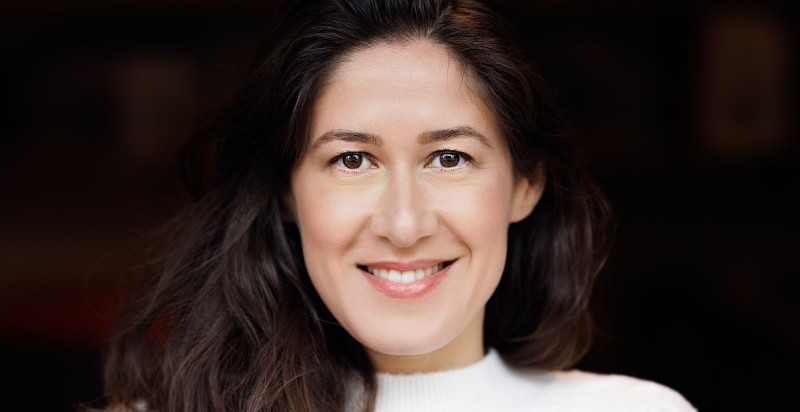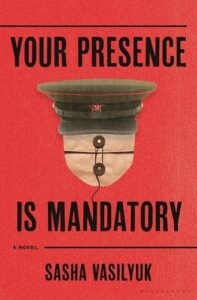
Sasha Vasilyuk on the Price of Secrecy in Russia and Ukraine
Jane Ciabattari Talks to the Author of “Your Presence Is Mandatory”
Sasha Vasilyuk’s propulsive first novel, which explores the repercussions of a wartime secret on the family of a Ukrainian Jewish WWII veteran, was written with a potent combination of empathy and urgency. It is being published at a crisis point in the history of her homeland. “I was editing the last chapter, which takes place during the start of the Russia-Ukraine conflict in 2014, when Putin launched the full-scale invasion of Ukraine,” she told me when I asked her about the effect of recent years of tumult on her life and work:
For someone who grew up in both countries and still had close family there, most of whom were suddenly in very serious danger, this was one of the most traumatic events of my life. And yet, it was also then that I was approached by my agent and very soon had a multi-country book deal on my hands. Ever since, I haven’t been able to shake the feeling that some wires got crossed between fiction and reality.
Our email conversation took place a few weeks after she’d published a CNN opinion piece on the anniversary of the war titled “I grew up in Ukraine and Russia. Here’s what I say when people ask where I’m from.”
*
Jane Ciabattari: This novel spans decades, from June 1941, at the onset of World War II through August 2015, after current war in Ukraine began in spring of 2014. How was your inspiration for this novel related to your own family history?
Sasha Vasilyuk: The novel is inspired by the story of my grandfather, a Ukrainian Jewish WWII vet who left a letter addressed to the KGB when he died, which revealed his hidden wartime past and completely shocked me and my family. In Your Presence is Mandatory, I wanted to dig deeper into his story of survival in Nazi Germany and USSR because it revealed parts of history that have been kept out of textbooks. I also wanted to investigate what is the price of secrecy on the secret-keeper, on their loved ones and on a whole society.
That trip made me realize how deeply connected these two wars are for the people who live there.
The book is also inspired by my trip to the Donbas to visit my family after the Russia-Ukraine conflict began there. My grandmother, who survived the Nazi occupation of Ukraine, never thought she’d live to see another war, especially started by Russia. The city was full of slogans and images that called back to the Soviet times. That trip made me realize how deeply connected these two wars are for the people who live there, so it made sense to create this epic, multigenerational, seventy-year arc.
JC: What sort of research was involved in writing about such a span of time? Family papers? Interviews? Other documents?
SV: Grandpa’s letter was very short and, given that it was addressed to the KGB and was written forty years after WWII, it wasn’t exactly reliable. It also contained almost no emotional truths and left a lot of unanswered questions. One of the main questions for me was, How does a Jewish soldier survive four years in Nazi Germany? I couldn’t answer it—and thus couldn’t write this book—until I came across the research of historians Pavel Polian and Aron Shneyer who’d interviewed Soviet Jewish POWs about exactly that question.
Luckily, for the other half of the book—what I call the “peace” part—I had help from my grandma’s memoir. The woman had an incredible memory and a knack for description, which was very helpful in getting the details of life in Ukraine in the postwar decades. Researching Soviet life is rife with state secrecy and, these days, with multiple Putin-sanctioned bans. So in many ways, that personal, lived experience is so much more valuable than typical historical research.
JC: How were you able to write the battle scenes in which Yefim Shulman is engaged as an artilleryman for the Red Army in Lithuania with such gritty realism?
SV: That was one of the parts I was most nervous about since I’ve never been in a war, obviously. My only experience was hearing shelling during my trip to the Donbas. I immersed myself in reading accounts by Soviet soldiers and journalists covering it. I also have a couple of friends who were Marines in Afghanistan. In describing war, I tried to steer away from the lyrical. War can sometimes lend itself toward lyrical and almost abstract (there is a gorgeous scene of an explosion in The Sympathizer, for example), but mostly I think war needs to stay in the realm of realism. It’s very bodily.
JC: What was your best source of detail for the four years after Yefim was captured in August 1941, as a POW, then escaped to work as an “ostarbeiter,” or forced laborer?
SV: It’s incredible how little research there is on both Soviet POWs and ostarbeiters. Mainly this is because both of these groups, which numbered in the millions, were repressed by the Soviet government and shunned by society. POWs, for example, weren’t treated as veterans—or received veterans’ benefits—until 1995, when most of them were in their seventies. Just think about that!
Consequently, most of them were too ashamed to talk about their experience, even privately to their loved ones. So research wasn’t easy. Besides the above book on Jewish POWs, I found another very thick Russian-language book about POWs and a recent podcast mini-series where ostarbeiters were interviewed. As a journalist, it was important for me to hear first person accounts.
At one point, as I worked on the first pass, I came across a paragraph that mentioned the German camp where my grandfather had been as a Soviet POW. I hadn’t been able to find anything on that camp—today, it’s basically a field with a headstone nearby that marks a mass grave. I realized that the paragraph was pulled from someone’s memoir and once I tracked it down, I discovered that the original typed pages were stored at Stanford’s Hoover Institution Library and Archives, an hour drive from my house.
I made an appointment and rushed there during one of those insane “atmospheric river” downpours. The car was basically swimming and it was very dangerous to drive, but I was determined. Once I held the pages in my hands, it turned out that the author had spent only two days at that camp and wrote only a couple of paragraphs on it. But I did learn that prisoners slept standing under the rain, which was yet another detail that was so beyond anything I could have imagined as a fiction writer that it made the crazy trip worthwhile.
JC: As a “repatriate” who rejoined the Red Army in the march to Berlin in April 1945, Yefim was questioned by SMERSH, the Soviet intelligence office, suspected of being a collaborator or a spy. “He was a prisoner of war, a forced laborer, and a Jew who had survived four years in the Reich, which was either very lucky or very suspicious.” How common was this experience?
I wanted to explore the multigenerational repercussions of one person’s secrecy.
SV: Every Soviet citizen found on enemy territory—about four million people—had gone through filtration where they were questioned by SMERSH. Many stayed in filtration camps, from which they could be sent back into the army or, especially once the war ended, to labor battalions back in the USSR, the Gulag where they rotted until after Stalin’s death eight years later, or home to their families. SMERSH was really a huge fork in the road for them.
JC: The title of your novel comes from a KGB summons your protagonist Yefim receives in September 1984, requiring him to report to the Donetsk, Ukrainian SSR administrative office. What strikes you about this title?
SV: The title projects a sense of threat and inescapability that underpins the emotional core of the novel as well as just of life in a totalitarian regime. Borrowing a phrase from a summons is also a nod to government forms that determined so much of who a person was, how they were treated, where they could go, and what they were allowed to do in life.
JC: Although Yefim is at the center of your narrative, your structure gives us this complex family story through multiple narrators, including Yefim’s wife Nina, his daughter Vita, and his granddaughter Masha. How did you decide on that approach?
SV: Secrecy and silence play a huge role in the Soviet society. I wanted to explore the multigenerational repercussions of one person’s secrecy, so showing what his wife, kids and grandkids are and aren’t seeing in him felt hugely important. The other characters also keep secrets of their own and though those secrets are smaller than Yefim’s, I was playing with the idea of the many reasons we hide certain parts of ourselves—often very defining parts—from those around us and sometimes even from ourselves.
JC: You were born in Crimea, raised in Russia and Ukraine, came to the U.S. at thirteen, studied journalism, became an award-winning journalist. Recently you have published several CNN essays about the war in Ukraine and the death of Navalny. How have you navigated these years of conflict between Ukraine and Russia, your own family separations, living your own life in the San Francisco Bay Area, and witnessing these changes?
SV: I have never been as politically aware or involved as in the past two years. I follow the war in Ukraine and the repressions in Russia. I’ve gotten to know many Soviet-born writers who live in the U.S. and foreign correspondents who are covering this crisis. And when I am alone, I am continuously tortured by the same questions that currently torture millions of people from that part of the world: How could this have happened? And what can be done?
JC: What are you working on now/next?
SV: I’m working on a more contemporary novel about turning a blind eye toward looming disaster, both in a private life and on a national level. It was going to feature Navalny, but now that he has been killed, I need to wrap my head around it in a new way. Anyway, it’s too early to tell whether I’ll be able to pull it off, but wish me luck.
__________________________________

Your Presence Is Mandatory by Sasha Vasilyuk is available from Bloomsbury Publishing.
Jane Ciabattari
Jane Ciabattari, author of the short story collection Stealing the Fire, is a former National Book Critics Circle president (and current NBCC vice president/events), and a member of the Writers Grotto. Her reviews, interviews and cultural criticism have appeared in NPR, BBC Culture, the New York Times Book Review, the Guardian, Bookforum, Paris Review, the Washington Post, Boston Globe, and the Los Angeles Times, among other publications.



















